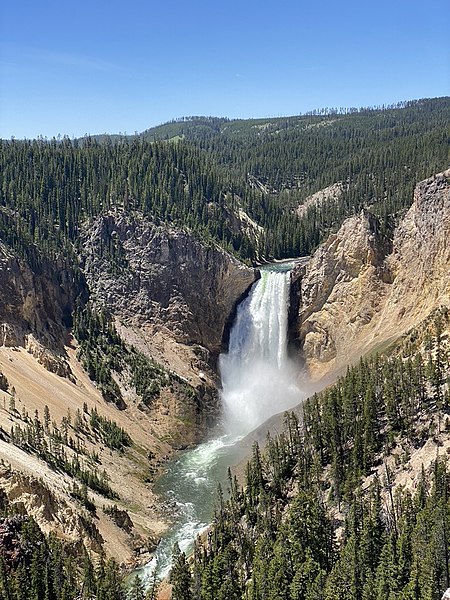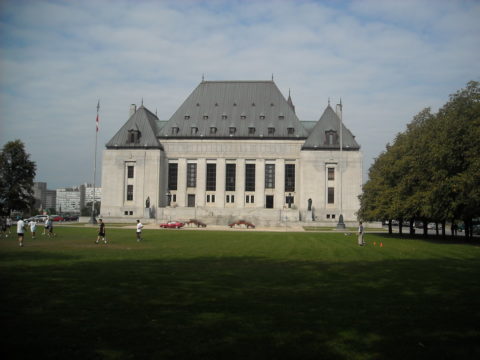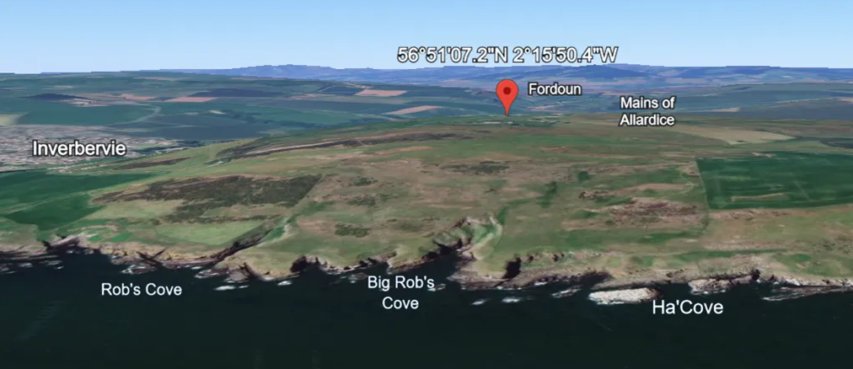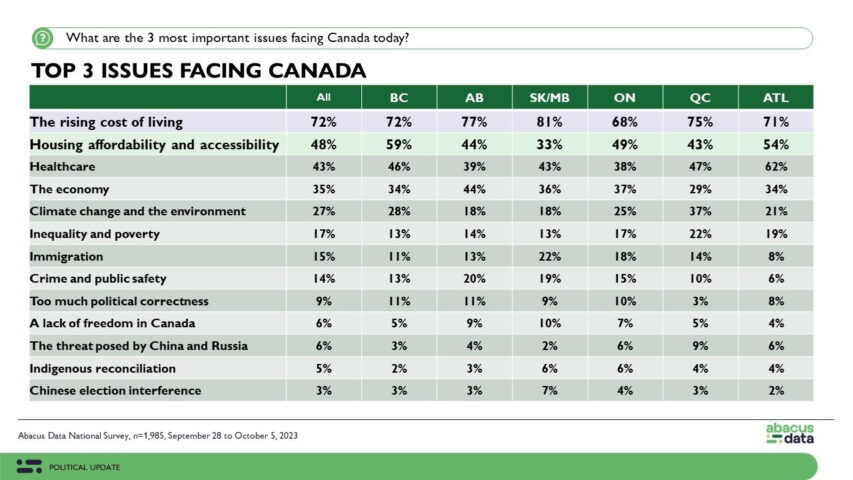spiked
Published Mar 27, 2024Europe’s farmers are rising up – and the elites are terrified. From the Netherlands to Germany to Ireland, farmers are taking to the streets, parking their tractors on the establishment’s lawn, spraying buildings with manure and bringing life to a standstill. The reason? Because unhinged green regulations, dreamt up by European Union bureaucrats, are immiserating them. In this spiked video polemic, Fraser Myers explores the roots of the farmers’ revolt across the continent – and explains why it must succeed. Watch, share and let us know what you think in the comments.
Support spiked:
https://www.spiked-online.com/support/
Sign up to spiked‘s newsletters: https://www.spiked-online.com/newslet…
Check out spiked‘s shop: https://www.spiked-online.com/shop/
March 28, 2024
Why European farmers are revolting
March 23, 2024
QotD: The SCIENCE was SETTLED in the 1970s
When it comes to Leftie, it’s really hard to sort out what’s intentional from what’s merely wrong, or outdated, or stupid, or some combination of the above. So while there really does seem to be some kind of coordinated push to get us to eat grass and bugs, the red meat thing is, I think, just old misinformation that Leftie can’t admit has been overtaken by events (because, of course, Leftists can never be wrong about anything). And I’ll even kinda sorta give them a pass on that, because I know a lot of medical people who learned the “red meat is bad for you” mantra back in the days and still haven’t gotten over it …
For younger readers, back in the late 70s the nutritional Powers That Be got in bed with the corn lobby. It sounds funny, but they were and are huge, the corn lobby — why do you think we’re still getting barraged with shit about ethanol, even though it’s actually much worse for the environment than plain ol’ dinosaur juice, when you factor in all the “greenhouse emissions” from growing and harvesting it? Anyway, ethanol wasn’t a thing back then … but corn syrup was, and so suddenly, for no reason whatsoever, the PTB decided that fat was bad and carbohydrates were good.
Teh Science (TM) for this was as bogus and politicized as all the other Teh Science (TM) these days, but since we still had a high degree of social and institutional trust back then — living in a country that’s still 85% White will do that — nobody questioned it, and so suddenly everything had to be “fat free”, lest you get high blood pressure and colon cancer and every other damn thing (ever notice how, with Teh Science (TM), everything they decide is bad suddenly correlates with everything that has ever been bad? Funny, that). But since fat is what makes food taste good, they had to find a tasty substitute … and whaddya know, huge vats full of corn syrup just kinda happened to be there. Obesity rates immediately skyrocketed; who’d have thunk it?
… but again, this isn’t a deliberate thing with your average Leftie. You know how they are about Teh Science (TM), even Teh Science (TM) produced by people who thought polyester bellbottoms were a great look, which alone should tell you everything you need to know. They just learned “red meat is bad”, and so, being the helpful sorts they are, decided to boss you around about it. You know, for your own good.
Severian, “Friday Mailbag / Grab Bag”, Rotten Chestnuts, 2021-06-25.
March 14, 2024
The insane pursuit of a “zero waste economy”
Tim Worstall explains why it does not make economic sense to pursue a truly “zero waste” solution in the vast majority of cases:
It’s entirely possible to think that waste minimisation is a good idea. It’s also possible to think that waste minimisation is insane. The difference is in what definition of the word “waste” we’re using here. If by waste we mean things we save money by using instead of not using then it’s great. If by waste we mean just detritus then it’s insane.
Modern green politics has — to be very polite about it indeed — got itself confused in this definitional battle. Which is why we get nonsense like this being propounded as potential political policy:
A Labour government would aim for a zero-waste economy by 2050, the shadow environment secretary has said.
Steve Reed said the measure would save billions of pounds and also protect the environment from mining and other negative actions. He was speaking at the Restitch conference in Coventry, held by the thinktank Create Streets.
Labour is finalising its agenda for green renewal and Reed indicated a zero-waste economy would be part of this.
This would mean the amount of waste going to landfill would be drastically reduced and valuable raw materials including plastic, glass and minerals reused, which would save money for businesses who would not have to buy, import or create raw materials.
The horror here does depend upon that definition of waste. Or, if we want to delve deeper, the definition of resource that is being saved.
[…]
OK. So, we’ve two possible models here. One is homes sort into 17 bins or whatever the latest demand is. Or, alternatively, we have big factories where all unsorted rubbish goes to. To be mechanically sorted. Right — so our choice between the two should be based upon total resource use. But when we make those comparisons we do not include that household time. 25 million households, 30 minutes a week, 450 million hours a year. At, what, minimum wage? £10 an hour (just to keep my maths simple) is £4.5 billion a year. That household sorting is cheaper — sorry, less resource using — than the factory model is it?
And that little slip — cheaper, less resource using — is not really a slip. For we are in a market economic system. Resources have prices attached to them. So, we can measure resource use — imperfectly to be sure but usefully — by the price of different ways of doing things. Cool!
At which point, recycling everything, moving to a zero waste economy, is more expensive than the current system. Therefore it uses more resources. We know this because we always do have to provide a subsidy to these recycling systems. None of them do make a profit. Or, rather, when they do make a profit we don’t even call them recycling, we call them scrap processing.
Which all does lead us to a very interesting even if countercultural conclusion. The usual support for recycling is taken to be an anti-price, anti-market, even anti-capitalist idea. Supported by the usual soap dodging hippies. But, as actually happens out in the real world, recycling is one of those things that should be — even if it isn’t — entirely dominated by the price system and markets. Even, dread thought, capitalism. We should only recycle those things we can make a profit by recycling. Because that’s now prices inform us about which systems actually save resources.
March 10, 2024
QotD: Sustainability
I would argue that financial stability has everything to do with environmental sustainability (though I will admit that this comparison is a bit hard since environmentalists seem to bend over backwards to NOT define “sustainability” very precisely). In fact, I think that sustainability is baked right into the heart of capitalism.
The reason for this comes back to the magic of prices. Of all the amazing, wondrous things we celebrate in the world, prices may be the most overlooked. Just think of it: with no governing structure or top down ruling board, a single number encapsulates everything most everyone in the world knows about a particular product: both its utility and relative scarcity, both now and as anticipated in the future. It is a consensus derived voluntarily between millions of people who never meet with each other and likely never communicate with each other.
It is amazing to me that people who talk so much about their concern for scarcity tend to be the same folks who ignore prices and even eschew markets and capitalism. But in prices we have a number that gives us a single metric telling us the world’s consensus on the current and future scarcity of any commodity.
We do know that prices can miss some things. Perhaps most relevant today, they can fail to include the cost of emissions (ground, water, air) associated with that commodities extraction, refining and processing, and use. But compared to the effort of trying to create some alternate structure for managing product scarcity, this is a relatively simple problem to fix (simple technically, but not necessarily politically). Estimates of these pollution costs can be added as a tax (e.g. a carbon tax on fossil fuels to take into account climate effects of CO2 emissions) and prices will continue to work their magic but with these new factors added.
Warren Meyer, “Sustainability Is Baked Right Into the Heart of Capitalism”, Coyote Blog, 2019-10-10.
February 3, 2024
The climate alarmists long ago gave up honest scientific reporting
Tom Knighton says he used to fully buy in to the climate alarmist message, but eventually realized the fix had been in for years, especially when it came to the predictive ability of all the climate change models … as in, their total lack of predictive ability:
When Al Gore’s An Inconvenient Truth came out, I watched it. I was terrified by the world being described, and since I was still pretty liberal and sort of an environmentalist, I took it all to heart.
Over time, as my personal politics shifted, I still had concerns regarding climate change. After all, it is what it is, right?
Until I came to look deeper into the issue and the one thing that shattered my belief in the whole concept: The fact that not a single climate model has ever panned out as predicted despite pretty much none of the draconian measures we’re told we need in order to avert disaster ever coming to fruition.
Science is supposed to be predictive. If it can’t predict something in its models, then scientists need to back up and figure out what the problem is. Instead, they seemingly just keep doubling down.
[…]
Let’s be clear here, the idea of taking measurements in heat islands is freshman year stuff. There’s absolutely no way they’re unaware the effect that’s having on their readings, even as most of their instruments are subject to heat bias.
In other words, I can’t accept this is a good faith error.
No, I believe this to be malicious.
Climatology isn’t exactly a field of science that would ever be considered sexy. Before all the climate alarmism, research grants were likely few and far between. People weren’t overly worried about the climate because it simply ways.
Then scientists started screaming that we were all doomed. The end is nigh, they told us, screaming at the top of their lung and acting just shy of wearing a sandwich board in Times Square.
With that came money and prestige.
Suddenly, climatologist could get recognition and write bestselling books. They could get grants from everyone and their brother to fund their research. The thing is, they had to keep up the charade. People had to believe that we were going to die if we didn’t do something.
Maybe they actually want the draconian measures they suggest, measures that pretty much amount to going back to living in mud huts, but with solar- and wind-created electricity so we won’t need to burn wood to survive.
Or something.
January 24, 2024
The father of the “Green Revolution”
In the latest review at Mr. and Mrs. Psmith’s Bookshelf, Jane Psmith reviews The Wizard and the Prophet by Charles C. Mann:
Norman Borlaug is generally estimated to have saved the lives of about a billion people who would otherwise have starved to death.
Yet despite all this — and Borlaug’s is a great story, which Charles Mann tells better and in far more detail than I do above — his book isn’t really a biography of Borlaug or of its other framing figure, early environmentalist William Vogt.1 Rather, it’s a compellingly-written and frankly fascinating overview of various environmental issues facing humanity, and of two different sorts of approaches one can take to addressing them. Mann opens by introducing the two men, but as soon as he’s done that they function mostly as symbols, examples and stand-ins, for these two schools of thought about the world and its problems.
Borlaug is the Wizard of the title, the avatar of techno-optimism: with hard work and clever application of scientific knowledge, we can innovate our way out of our problems. Vogt is the Prophet, the advocate of caution: he points to our limitations, all the things we don’t know and the complex systems we shouldn’t disturb, warning that our constraints are inescapable — but also, quietly, that they are in some sense good.
It’s not hard to identify the Wizards all around us. Inventors and innovators, transhumanists and e/acc, self-driving cars and self-healing concrete … every new device or technique for solving some human problem — insulin pumps! heck, synthetic insulin at all! — is a Wizardly project.
It’s a little more difficult to pin down what exactly the Prophets believe, in part because they spend so much time criticizing Wizardly schemes as dangerous or impractical that it’s easy to take them for small-souled enemies of human achievement.2 That isn’t fair, though — there’s a there there, a holistic vision of the world as an integral organic unity that we disturb at our peril, because the constraints are inextricably linked to the good stuff.
If that seems too abstract, here’s an example. Imagine for a moment (or maybe you don’t have to imagine) that you have a friend who subsists entirely on Soylent. It’s faster and easier than cooking, he says, and cheaper than eating out. He’s getting all his caloric needs met. And he’s freed up so much time for everything else! Now, anyone might express concern for his physical health: does Soylent actually have the right balance of macronutrients to nourish him? Is he missing some important vitamins or other micronutrients that a normal diet might provide? Is the lack of chewing going to make his jaw muscles atrophy? And those are all reasonable concerns about your friend’s plan, but they all have possible Wizardly solutions. (A multivitamin and some gum would be a start.)
If you’re a Prophet sort, on the other hand, you’re probably going to start talking about everything else your friend is missing out on. There’s the taste of food, for one, but also the pleasures of color and texture and scent, the connection to the natural world, the role of community and tradition in shared meals, the way cooking focuses thought and attention on incarnate reality. You might throw around words like “lame” and “artificial” and “sterile” and “inhuman”. Your friend’s Soylent-only plan assumes that the whole point of food is to consume an appropriate number of calories as quickly and easily as possible, hopefully in a way that doesn’t meaningfully degrade his health, but a Prophet rejects his premise entirely. Instead, a Prophet argues that your friend’s food “problem” is actually part of the richly textured beauty of Creation. Yes, feeding yourself and your loved ones delicious, healthful, and economical meals takes time and effort, but that’s simply part of being human.5 You should consider that a challenge to be met rather than a threat to be avoided.
Unfortunately, Mann does the Prophets a disservice by choosing William Vogt as their exemplar. Yes, he was an important figure in the history of the modern environmental movement. Yes, he wrote a very influential book.4 And yes, his careful attention to the integrity of the ecosystems he studied was quintessentially Prophet. But he saw human beings mostly as disruptions to the integrity of those ecosystems, and pretty much every one of his specific predictions — not to mention the predictions of his many followers, most famously Paul Erlich in The Population Bomb5 — have simply failed to come true. Compared to Borlaug’s obvious successes, Vogt’s dire warnings that humanity will soon exhaust the Earth’s capacity and doom ourselves to extinction (unless we abort and contracept our way there first; his second act was as director of Planned Parenthood) seem laughable. Reading about his life can leave you with the impression that Prophets are just people who are more worried about a spotted owl than a starving child, and frankly who cares what those people think?
1. They were roughly contemporaries, but this is emphatically not the story of a pair of rivals; they encountered each other in person only once, in passing, after which Vogt wrote an angry letter to the Rockefeller Foundation demanding they cease Borlaug’s Mexican project at once.
2. And, to be fair, a lot of the language and arguments pioneered by Prophets does get employed by a sclerotic managerial class opposed to anything they can’t fit neatly into their systems and processes and domain-agnostic expertise. But more on that later.
3. Incidentally, this is more or less the argument between the Wizards and the Prophets when it comes to soil. Wizards are delighted with the Haber-Bosch process and artificial fertilizers; Prophets decry the “NPK mentality” that sees the soil as a passive reservoir of chemicals and instead laud composting, manure, and other techniques that encourage the complex interactions between soil organisms, plant roots, and the physical characteristics of humus. This is the origin of the fad for “organic”, a label that doesn’t mean much when applied to industrial-scale food production and is often more trouble than it’s worth for small-time farmers and ranchers. Still, Mann’s story of the movement’s birth is interesting.
4. You’ve probably never heard of it, but it was influential!
5. Apparently out of print! Good.
January 13, 2024
It’s not lying lying
Paul Homewood on how Brits are propagandized through slanted reporting on the weather (which has always been a topic of interest in the British Isles):
Storm Gerrit arrived the day after Boxing Day, accompanied by the usual headlines: “85mph gales barrelled down on Britain”, screamed the Daily Mail.
As usual the public were being deliberately deceived. The 85mph claim was based on one site in North East Scotland, at the top of a 400ft cliff overlooking the North Sea, marked in red below.
A few miles away at sea level average wind speeds never got above 30mph. The Met Office never reports any of this, preferring to publish its favourite sites on clifftops or halfway up mountains.
It was the same story a week later, when another system of low pressure came along to be given yet another silly name, “Henk”.
“94mph winds pummel the UK”, shrieked the Mirror. This time the wind speeds were measured on the Met Office’s go-to weather station, the Needles, off the Isle of Wight. As this column has discussed before, the Needles sit at the end of a long, narrow peninsula, and the station is on top of a 260ft cliff. Winds there are routinely 30mph higher than even exposed sites nearby, such as St Catherine’s Point. Meanwhile average winds inland were typically around 30mph.
It rained as well last week! During the two days of Storm Henk, about an inch fell in parts of southern and central England. There is nothing at all unusual about this amount; it is the sort of thing which happens every year. Because the ground was already saturated, following wet weather last month, there was inevitably some flooding. But, for the most part, this was little more than flooded fields, overflowing river banks and localised flooding. Again, normal scenes in England. And as Patrick Benham-Crosswell pointed out in TCW this week, many houses built on flood plains were once again flooded. There was certainly none of the major river flooding which has hit the country many times in the past.
According to the Environment Agency, about 2,000 properties were flooded, a tragedy for everybody involved. But in overall terms, this is a tiny number. For instance, 55,000 were flooded in 2007.
Inevitably, the media jumped to blame it all on climate change. According to ITV: “Henk is the eighth named storm to have hit the country this winter and the pattern is likely to continue due to the effects of climate change. ‘This is climate change and the impacts we are seeing,’ the Environment Agency’s Tom Paget added. ‘We are seeing these increasingly wet and blustery winters. We are seeing storm upon storm which is exacerbating the issues’.”
Claims like this explain why the Met Office decided to start giving every low-pressure system a silly name back in 2015. But as it admitted in its State of the UK Climate last year, storms used to be much stronger:
The most recent two decades have seen fewer occurrences of max gust speeds above these thresholds [40, 50, 60 kts] than during the previous decades, particularly comparing the period before and after 2000.
This earlier period [before 2000] also included among the most severe storms experienced in the UK in the observational records including the “Burns Day Storm” of 25 January 1990, the “Boxing Day Storm” of 26 December 1998 and the “Great Storm” of 16 October 1987. Storm Eunice in 2022 was the most severe storm to affect England and Wales since February 2014, but even so, these storms of the 1980s and 1990s were very much more severe.
Nor is there any evidence that December or the autumn last year were unusually wet.
We look like getting a few weeks of cold, dry weather from now on – so expect drought warnings soon!
December 26, 2023
The awe-inducing power of volcanoes
Ed West considers just how much human history has been shaped by vulcanology, including one near-extinction event for the human race:
A huge volcano has erupted in Iceland and it looks fairly awesome, both in the traditional and American teenager senses of the word.
Many will remember their holidays being ruined 13 years ago by the explosion of another Icelandic volcano with the epic Norse name Eyjafjallajökull. While this one will apparently not be so disruptive, volcano eruptions are an under-appreciated factor in human history and their indirect consequences are often huge.
Around 75,000 years ago an eruption on Toba was so catastrophic as to reduce the global human population to just 4,000, with 500 women of childbearing age, according to Niall Ferguson. Kyle Harper put the number at 10,000, following an event that brought a “millennium of winter” and a bottleneck in the human population.
In his brilliant but rather depressing The Fate of Rome, Harper looked at the role of volcanoes in hastening the end of antiquity, reflecting that “With good reason, the ancients revered the fearsome goddess Fortuna, out of a sense that the sovereign powers of this world were ultimately capricious”.
Rome’s peak coincided with a period of especially clement climatic conditions in the Mediterranean, in part because of the lack of volcanic activity. Of the 20 largest volcanic eruptions of the last 2,500 years, “none fall between the death of Julius Caesar and the year AD 169”, although the most famous, the eruption of Vesuvius in AD 79, did. (Even today it continues to reveal knowledge about the ancient world, including a potential treasure of information.)
However, the later years of Antiquity were marked by “a spasm” of eruptions and as Harper wrote, “The AD 530s and 540s stand out against the entire late Holocene as a moment of unparalleled volcanic violence”.
In the Chinese chronicle Nan Shi (“The History of the Southern Dynasties”) it was reported in February 535 that “there twice was the sound of thunder” heard. Most likely this was a gigantic volcanic explosion in the faraway South Pacific, an event which had an immense impact around the world.
Vast numbers died following the volcanic winter that followed, with the year 536 the coldest of the last two millennia. Average summer temperature in Europe fell by 2.5 degrees, and the decade that followed was intensely cold, with the period of frigid weather lasting until the 680s.
The Byzantine historian Procopius wrote how “during the whole year the sun gave forth its light without brightness … It seemed exceedingly like the sun in eclipse, for the beams it shed were not clear”. Statesman Flavius Cassiodorus wrote how: “We marvel to see now shadow on our bodies at noon, to feel the mighty vigour of the sun’s heat wasted into feebleness”.
A second great volcanic eruption followed in 540 and (perhaps) a third in 547. This led to famine in Europe and China, the possible destruction of a city in Central America, and the migration of Mongolian tribes west. Then, just to top off what was already turning out to be a bad decade, the bubonic plague arrived, hitting Constantinople in 542, spreading west and reaching Britain by 544.
Combined with the Justinian Plague, the long winter hugely weakened the eastern Roman Empire, the combination of climatic disaster and plague leading to a spiritual and demographic crisis that paved the way for the rise of Islam. In the west the results were catastrophic, and urban centres vanished across the once heavily settled region of southern Gaul. Like in the Near East, the fall of civilisation opened the way for former barbarians to build anew, and “in the Frankish north, the seeds of a medieval order germinated. It was here that a new civilization started to grow, one not haunted by the incubus of plague”.
December 17, 2023
How RFK, Jr. helped destroy British Columbia’s resource-based economy
Elizabeth Nickson found herself added to one of Robert F. Kennedy Jr.’s fundraising mailing lists:

Robert F. Kennedy, Jr. speaking in Urbana, Illinois on October 14, 2007.
Photo by Daniel Schwen via Wikimedia Commons.
I am on RFKJr’s campaign mailing list, probably through Children’s Health Defence and they asked me for money, and I said sure, just as soon as he fixes the catastrophe he caused in the province where I live.
Got a message back!
It read, “Elizabeth, I am sure Robert would fix whatever harm he caused, can you explain?”
No problem, I said.
1. In British Columbia, we had the largest industrial forest in the world
2. It paid for education and universal “free” health care.
3. The environmental left decided to shut it down.
4. The reason for their protest was that the government, as was common practice, had sold cutting permits with long leaseholds. A new socialist government announced it was pulling the permits and taking those forests back.
5. In order not to lose all the invested money, which they had not only paid for upfront and in annual leasing charges, but paid taxes on, some for decades, lessees immediately clear cut their lands. Clear cuts are ugly. (but they are fire breaks)
6. That triggered the protest.
7. RFK Jr came in under RiverKeepers and supercharged the protest. His celebrity and glamour made the protest major international news. I was in London, I heard about it. More kids joined the protest. And then more and more. Until the government caved. Would it have happened without his presence? I do not think so. He gave very young people who had no access to power, nor any hope of it, ever, a very heady hit of significance and their lives took on huge huge meaning. For many it remains the high point of their lives. Because for the province, it was all downhill from there. All promise vanished and a grinding slow growth followed.
8. Over the ensuing ten years, cutting was diminished and heavy regulation covered the rest. By 2002, written regulations piled on top of each other stood seven feet high, taller than a man.
9. Forested communities died.
10. 100,000 families lost their livelihood.
11. Resource jobs have huge multipliers, not only forested towns died, so did regional metropolitan centers. Greens, replete with success, hit other resource industries – mining, ranching – which died. More families bankrupted.
12. They were told to go into tourism.
13. Which pays minimum wage and can only support a family if everyone, even the children, work. And, it’s seasonal.
14. Over time, the unmanaged forests became clogged with overgrowth, little trees like carrots pulled all the water from the forest floor, desiccated the soil and then pulled water from aquifers. The forests became tinder. And increasingly every summer, they explode in fire.
15. The government needed money.
16. Casinos provided it.
17. Asian cartels – you cannot imagine how violent they are – moved in and used the casinos to launder most of the drug money from North America. They bribed immigration, they bribed city government, they threatened anyone who tried to stand in their way.
18. They were so successful, human trafficking and child sex trafficking shot up. We have the second largest port on the west coast of North and South America. Through it streams container loads of drugs and trafficked children and women. At the port, you just stand aside, if you want to live. You think most of the fentanyl comes in through Mexico? Nope. It comes in through us.
19. The cartels do pay taxes. You think Black Rock is bad? These guys kill if they don’t get what they want. They are buying every business they can, to launder money through. The cartels also launder money through real estate in the city. That means housing is insanely expensive and property taxes are sky high. Canadians can’t afford to buy houses or live in the ones they own. A family making a median income has to pay 100% of income to buy a median priced house.
20. Crime is a) a driver of the economy and b) a principal source of government revenue.
21. Green has destroyed the province.
And that, I am afraid, is what celebrities do. It is why they are so hated, and one of the reason Hollywood is dying. They destroy the lives of ordinary men and women, and then move on to greater heights. Their lives are so privileged, they have absolutely no idea how people make money. And RFKJr, mind-numbingly privileged from birth, is the same. When asked about climate change, he says it’s happening but taxes won’t work. “Regenerative agriculture” he says, vaguely. It is true, regenerative agriculture could capture a lot of carbon, the amount debatable but it has promise. But cutting regulation? He has no, zero, absolutely no idea of how regulation punishes the non-elites. His is a black hole of ignorance and that is common; a majority have zero idea. Zero.
December 16, 2023
Do Droughts Make Floods Worse?
Practical Engineering
Published 5 Sept 2023The answer isn’t as simple as you might think!
One statistician famously said, “All models are wrong, but some are useful”. And even something as simple as the flow of water into the soil has so many complexities to keep track of. Like most answers to simple questions in engineering and in life: the answer is that it’s complicated.
(more…)
November 20, 2023
The latest scam – Natural Asset Companies (NACs)
Elizabeth Nickson on the US Securities and Exchange Commission’s plan to magic up some new ways to “financialize” national parks and other federally regulated places for the benefit of the hyper-wealthy and well-connected:

Soon to be a financially performing asset of BlackRock?
Grand Canyon of the Yellowstone, 21 June 2021. Photo by Grastel via Wikimedia Commons.
Delayed but not stopped, the U.S. government is planning a rule that allows for America’s protected lands, including parks and wildlife refuges, to be listed on the N.Y. Stock Exchange. Natural Asset Companies (NACs) will be owned, managed, and traded by companies like BlackRock, Vanguard, and even China.
The deadline was Friday, but earlier this week, the deadline was postponed until January. This is the usual criminal feint from the environmental movement and the administrative state. People are complaining? Let’s put it off till they go back to sleep. Then we will steal their birthright late at night, in precisely the manner we have stolen everything else.
[…]
The entire universe envies the lush interior of the U.S. Increasingly empty, it is filled with a cornucopia of minerals, fiber, food, waters, extraordinarily fertile soil as well as well-ordered, educated, mostly docile people. Worth in the quadrillions, if one could monetize and trade it, financialize it, the way the market has financialized the future labor of Americans, well, it would be like golden coins raining from the sky.
On October 4th, the Securities and Exchange Commission filed a proposed rule to create Natural Asset Companies (NACs). A twenty-one day comment period was allowed, which is half the minimum number of days generally required and when they postponed passing the rule, they did not extend the comment period. “Nope, shut up,” they said.
NACs will allow BlackRock, Bill Gates, and possibly even China to hold the ecosystem rights to the land, water, air, and natural processes of the properties enrolled in NACs. Each NAC will hold “management authority” over the land. When we are issued carbon allowances, owners of said lands will be able to claim tax deductions and will be able to sell carbon allowances to businesses, families and townships. In the simplest of terms, that’s where the money will be made. WE peons will be renting air from the richest people on earth.
The following are eligible for NACs: National Parks, National Wildlife Refuges, Wilderness Areas, Areas of Critical Environmental Concern, Conservation Areas on Private and Federal Lands, Endangered Species Critical Habitat, and the Conservation Reserve Program. Lest you think that any conserved land is conserved in your name, the largest Conservation organization in the U.S., is called The Nature Conservancy, or TNC, which, while being a 501(c)3, also holds six billion dollars of land on its books. Those lands have been taken using your money via donations and government grants, and transferred to the Nature Conservancy, which can do with those lands what it wills.
If this rule passes, America’s conserved lands and parks will move onto the balance sheets of the richest people in the world. Management of those lands will be decided by them and their operations, to say the least, will be opaque.
μολὼν λαβέ, buddy.
November 19, 2023
“This was a law despised by almost everybody who hasn’t personally had intimate relations with an old-growth tree or an orca”
Colby Cosh meditates on the unexpectedly sensible decision by a Federal Court judge, striking down the Feral government’s virtue-signal-made-law on single-use plastic items:

“Single use plastic objects on pink background” by wuestenigel is licensed under CC BY 2.0 .
On Thursday a Federal Court judge, the Hon. Angela Furlanetto, startled the Dominion by essentially sweeping aside the Liberal government’s ban on a short list of single-use plastic items, including grocery bags, cutlery, takeout containers and drinking straws. This was a law despised by almost everybody who hasn’t personally had intimate relations with an old-growth tree or an orca. We all now live in a world where we accumulate large numbers of cloth grocery bags and eat takeout meals off of wooden disposable cutlery in the name of the environment; meanwhile, we no longer accumulate the “single-use” grocery bags that us skinflints used to hoard and reuse before consigning them harmlessly to a landfill.
All right, maybe it’s a stupid law that does more environmental harm than good. Federal governments are allowed to make those! But Justice Furlanetto, asked for judicial review by Alberta and Saskatchewan and a coalition of petrochemical processors, concluded that the actual rule was “both unreasonable and unconstitutional”.
Her judgment is a thorny 200-paragraph monster, but the innermost logic of it is simple. The federal Environmental Protection Act allows Ottawa to ban or restrict “toxic” substances that might enter the environment. In 2021 the Liberals made a cabinet order essentially saying “These here single-use plastic items are hereunto declared to be toxic. Abracadabra!” No one can show that these items are actually poisonous in the ordinary sense, and the listed items weren’t condemned as substances, i.e., for their chemical content or composition. The reasoning of the government was that if an Arctic lynx might choke on the ring from a six-pack of Labatt Blue, that kinda sorta makes the plastic in the ring “toxic”, and justifies the federal government in the use of its criminal-law power.
I don’t know if anyone at the cabinet table anticipated how this argument would fare under a “reasonableness” analysis with lawyers for two provinces, plus Dow Chemical and Imperial Oil, among others, on the opposite side. But the government almost certainly faced a piece of extra bad luck in having the case go before Justice Furlanetto, a jurist with hard-science credentials that include a master’s degree in biochemistry. She did not like the slippery game being played with the concept of “toxicity”, not one bit.
In her judgment she observes that the explicitly stated rationale for the plastics ban was that “all plastic manufactured items have the potential to become plastic pollution”. Justice Furlanetto found this reasoning to be puzzlingly ass-backward. “The basic principle of toxicity for chemicals is that all chemical substances have the potential to be toxic,” she writes. “However, for a chemical substance to be toxic it must be administered to an organism or enter the environment at a rate (or dose) that causes a high enough concentration to trigger a harmful effect. In this instance, the reverse logic appears to be applied: all PMI are identified as toxic because they are made of plastic and because all plastic is deemed to have the potential to become plastic pollution.”
November 15, 2023
Can we criticize the Climate Goblin now?
Brendan O’Neill asks if it’s allowed to criticized Greta “The Climate Goblin” Thunberg now:
Can we criticise Greta Thunberg now? For a time, anyone who raised even the mildest objection to the pint-sized prophetess of doom risked being damned as a bully. Surely this moratorium on Greta-scepticism will end following her platforming – to use woke lingo – of an activist with very iffy views. An activist who has trivialised the Holocaust and seems pretty chilled about Hamas’s pogrom of 7 October. Calling out Greta for her fact-lite blather about the planet being “on fire” may have been forbidden – pulling her up for hanging out with Holocaust relativists must not be.
Thunberg has made waves by switching her focus from saving the planet to saving Gaza. Like every other Gen Zer with a TikTok and an insatiable urge to signal his / her / zir virtue to the world, she’s become an overnight authority on Israel-Palestine. She posed with a placard saying “Stand with Gaza“. She turned Fridays for Future – where pious rich kids bunk off school to raise awareness about climate change – into “Justice for Palestine” stunts. And on Sunday, she made a climate protest in Amsterdam pretty much all about Palestine.
She invited activists to the stage. One was Sara Rachdan, a Palestinian studying in Amsterdam. It didn’t take German newspaper Bild long to discover that Ms Rachdan holds views which – how should we put this? – are not very pleasant. On Hamas’s pogrom, Ms Rachdan said: “This is finally Palestinians taking action [against] the occupation”. She’s dabbled in Holocaust denigration. She shared a blood-spattered graphic comparing Israel’s actions in Gaza with the Nazis’ actions in Auschwitz. Repulsively, it implies the Jewish State is worse than the Nazis. Where 127 kids a day were killed in Auschwitz, 178 a day are currently dying in Israel’s war in Gaza, it alleges.
Shorter version: the Jews are more accomplished child-killers than even Hitler’s henchmen were. This is rank Holocaust relativism. Comparing the greatest crime in history to this horrendous war denudes that crime of its unique horror. It renders it ordinary. It was no big deal – just the same kind of thing you see on your TV screens every night from Gaza. The implication of moral equivalence between the Nazis’ minutely planned gassing of Jewish children and the deaths of Palestinian kids as a terrible byproduct of Israel’s war on Hamas is beyond immoral. It is the gravest of inversions, treating the Jewish State’s war against anti-Semitic mass murderers as indistinguishable from the Nazis’ acts of anti-Semitic mass murder.
Of course, there’s nothing to suggest Greta shares Ms Rachdan’s views. But isn’t her woke generation obsessed with “platforming”, with only rubbing shoulders with the perfectly politically correct and no one else? Indeed, Thunberg ostentatiously flounced out of the Edinburgh Book Festival earlier this year because it received funding from a firm that invests in fossil fuels. Take oil money and she’ll dodge you like the plague; describe an anti-Semitic pogrom as an act of resistance and she’s all over you like a cheap suit. Care to explain, Greta?
November 8, 2023
QotD: Climate change, sorcerism and magical thinking
Many primitive societies believe that maleficient spirits cause all sorts of human misfortune that in the modern West we have learned to attribute to natural causes – cattle dying, crops failing, disease, drought, that sort of thing. A few societies have developed a more peculiar form of supernaturalism, in which evil spirits recede into the background and all misfortune is caused by the action of maleficient human sorcerers who must be found and rooted out to end the harm.
A society like that may be a grim, paranoid place with everyone constantly on the hunt for sorcerers – but a sorcerer can be punished or killed more easily than a spirit or a blind force of nature. Therein lies the perverse appeal of this sort of belief system, what I’ll call “sorcerism” – you may not be able to stop your cattle from dying, but at least you can find the bastard who did it and hurt him until you feel better. Maybe you can even prevent the next cattle-death. You are not powerless.
[…]
The most puzzling thing about the whole exchange was his insistence on interpreting my talk about the weather as a political move. I report the Central Valley superstorm of 1861-62 and R’s response is “When did you turn into Rush Limbaugh?” Uh, WTF, over?
It took me a while to model the frame of mind that produced this, but when I managed to I had an insight. Which is why I’m writing this essay. I think, now, what I actually threatened was R’s belief that he, or somebody, could do something emotionally satisfying about the bad weather. Fix it, or prevent it from recurring, or at least punish the bastards who did it.
Supernaturalizing the causes of large-scale misfortunes has become a difficult strategy to sustain for anyone with more exposure to modern scientific knowledge than a cinderblock. Politicizing them into someone’s bad juju, however … that’s easy. And, perhaps, more attractive than ever before – because the alternative is to feel powerless, and that is painful.
Science and the increase in our control over our immediate environment at the small scale may, in fact, be driving us back towards a sort of sorcerism by making the feeling of powerlessness more painful. We are children of humanism and the Enlightenment; terror of the storm and dark is something we associate with the bad old days of angry gods. We should be beyond that now … shouldn’t we?
Thus, the politicization of every bad thing that happens. And people like R, for whom “When did you turn into Rush Limbaugh?” becomes a sort of aversive charm to ward off fear of the Central Valley superstorm and its like.
Yes, we need a word for this, too. Not “sorcerism”; “politicism”, perhaps. The insistence on locating for every large-scale problem a human cause that can be addressed through politics and a set of serviceable villains to punish. Also, the insistence that anyone who rejects the politically fashionable explanation must be in league with the evil sorcerers.
Unfortunately, reality isn’t like that. If a supernova goes off within eight parsecs of us and strips off the Earth’s ozone layer it won’t have been Halliburton or the International Communist Conspiracy that did it. And if the Central Valley superstorm does repeat on us – well, statistically that looked pretty likely at a mean interval of about 150 years; welcome to your new normal, and hunting for the evil carbon-or-whatever emitters that did it is highly unlikely to do any more than supplying you with a scapegoat to ease your hurt feelings.
Finally … feeling powerless may suck, but on the whole it’s preferable to sorcerer hunts. People get killed in sorcerer hunts, almost always people who are innocent. One reason I’m not a politicist is that I don’t want to be any part of a howling mob. It’s a form of self-restraint I recommend to others.
Eric S. Raymond, “Heavy weather and bad juju”, Armed and Dangerous, 2011-02-03.
November 5, 2023
Dear Supreme Court of Canada, “ever get the feeling you’ve been cheated?”
Colby Cosh outlines the arguments the federal government used to persuade a majority of the sitting justices of the Supreme Court of Canada to greenlight Justin Trudeau’s carbon tax tax grab and wonders if they suspect they got fast-talked:

“Supreme Court of Canada, Ottawa” by daniel0685 is licensed under CC BY 2.0
The decision agreeing to this was signed by six of the nine justices of the court: Richard Wagner, Rosalie Abella, Michael Moldaver, Andromache Karakatsanis, Sheilah Martin and Nicholas Kasirer. Today I confront these eminences with the immortal question once asked by Johnny Rotten: ever get the feeling you’ve been cheated?
Last week the Liberal government whose hirelings rhapsodized about the urgent, indivisible, inherently national nature of carbon pricing announced a “temporary” total exemption for fuel oil used for home heating. This has the effect of letting some households in the Atlantic provinces out of a tax that applies to cleaner BTUs in the rest of the country, and the targeted regional nature of this move has been emphasized rather than concealed by Liberal ministers.
Oh, to be sure, it’s temporary. The three-year duration of the exemption just happens to push its expiry past the next federal election. What happens at that point, who knows? And to be sure, the exemption applies to fuel oil for home heating everywhere in Canada where the federal carbon tax applies. It just so happens that the electorally crucial Atlantic is the only place where a significant number of households still depend on the system. The Liberals can perhaps say with a straight face that there is no conflict here with the underpinnings of the arguments that succeeded so beautifully in the Supreme Court.
But if the GGPPA References were re-litigated now, after the attempt to impose the carbon tax and the panicky local retreat, one wonders whether the “national concern” blarney would seem quite so convincing. We are not, in turns out, all in this leaky planetary lifeboat together. The urgency of carbon pricing, it turns out, is not quite paramount and transcendent. Its indivisibility and inherent nationalness are not as promised. The Liberals didn’t want to save the planet quite so much, it seems, as they just wanted to make the rules for their own electoral benefit.
At The Line, Harrison Ruess, who recently switched his home heating solution from a mixed oil and propane to just propane, wonders why his choice to go with the lower-carbon option will end up penalizing him under the latest policy change by the feds:
Indeed, in looking deeper at the regional numbers, the concern about the rising cost of living and housing affordability isn’t particularly acute in Atlantic Canada versus other parts of the country. The chart below, provided to me by David Coletto at Abacus Data, and published here at The Line first, reveals just how difficult a position the PM has now staked out for his government. While Atlantic Canadians are somewhat more concerned about housing affordability than average, they are very slightly less concerned than the average Canadian about the overall rising cost of living. In Saskatchewan and Manitoba, for example, the opposite is true: they’re less concerned than average about housing affordability, but more concerned than average about the rising cost of living.
The takeaway to me in looking at this is that all Canadians are worried about costs and affordability.
The other question that jumped to mind is: why only heating oil? Heating oil is useful in places without good access to natural gas pipelines, and that does include much of Atlantic Canada, but also to rural areas everywhere, where other fuels, such as propane or wood pellets, are also used. According to the propane association, there are about 200,000 Canadian homes using propane — of which about 30,000 are in Atlantic Canada.
I can speak to this with some personal experience. When my wife and I purchased our home in semi-rural Ottawa, it had a Frankenstein heating system that used heating oil for part of our home and propane for another. Just this summer we completed a (somewhat expensive) rationalization of our system to combine the two into one larger, though more efficient, propane system.
Having one system will hopefully save us money on maintenance and hydro costs — powering and maintaining one system should cost less than two. It will also save us a couple hundred bucks a year on our home insurance (did you know there’s an extra premium if you have a heating oil tank? Welcome to rural life, dear readers.) Ditching the oil and expanding the propane is also good environmentally, since the carbon impact of propane is considerably less.
But we didn’t get a break from the federal government. We’d only have gotten it if we’d gone the other way, and used the more polluting fuel. Why punish my family for heating our home using the cleaner fuel?
And why not provide an exemption for natural gas? It’s cleaner still. And why not people in cities? They don’t want to freeze either, and we’re all broke. The carbon tax isn’t helping, no matter which fuel you’re using or which part of the country you call home. The ultimate challenge the government will face is that they cannot talking-point their way out of a reality.










